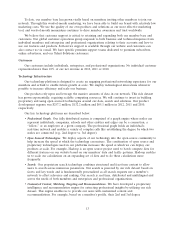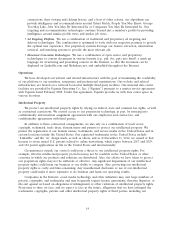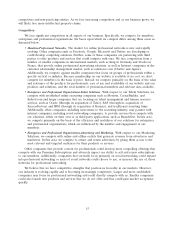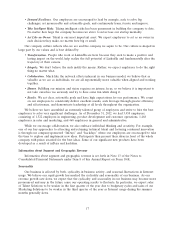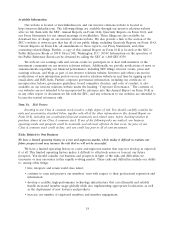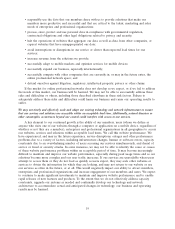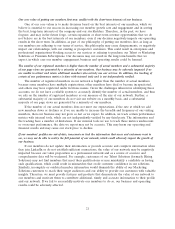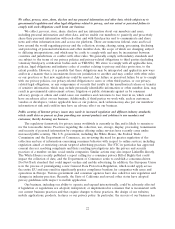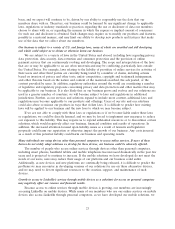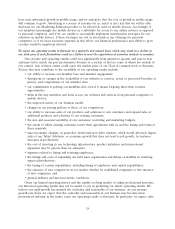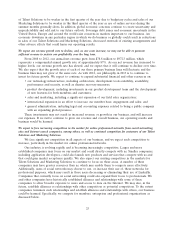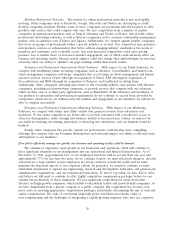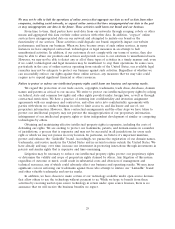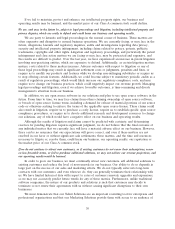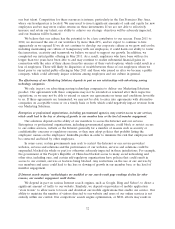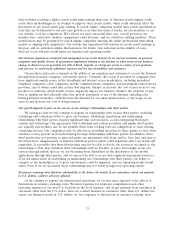LinkedIn 2012 Annual Report Download - page 25
Download and view the complete annual report
Please find page 25 of the 2012 LinkedIn annual report below. You can navigate through the pages in the report by either clicking on the pages listed below, or by using the keyword search tool below to find specific information within the annual report.been, and we expect will continue to be, driven by our ability to responsibly use the data that our
members share with us. Therefore, our business could be harmed by any significant change to applicable
laws, regulations or industry standards or practices regarding the use or disclosure of data our members
choose to share with us, or regarding the manner in which the express or implied consent of consumers
for such use and disclosure is obtained. Such changes may require us to modify our products and features,
possibly in a material manner, and may limit our ability to develop new products and features that make
use of the data that we collect about our members.
Our business is subject to a variety of U.S. and foreign laws, many of which are unsettled and still developing
and which could subject us to claims or otherwise harm our business.
We are subject to a variety of laws in the United States and abroad, including laws regarding privacy,
data protection, data security, data retention and consumer protection and the provision of online
payment services that are continuously evolving and developing. The scope and interpretation of the laws
that are or may be applicable to us are often uncertain and may be conflicting, particularly laws outside
the United States. For example, laws relating to the liability of providers of online services for activities of
their users and other third parties are currently being tested by a number of claims, including actions
based on invasion of privacy and other torts, unfair competition, copyright and trademark infringement,
and other theories based on the nature and content of the materials searched, the ads posted, or the
content provided by users. In addition, regulatory authorities around the world are considering a number
of legislative and regulatory proposals concerning privacy and data protection and other matters that may
be applicable to our business. It is also likely that as our business grows and evolves and our solutions are
used in a greater number of countries, we will become subject to laws and regulations in additional
jurisdictions. Further, as our services and solutions expand to include more content, additional laws and
regulations may become applicable to our products and offerings. Users of our site and our solutions
could also abuse or misuse our products in ways that violate laws. It is difficult to predict how existing
laws will be applied to our business and the new laws to which we may become subject.
If we are not able to comply with these laws or regulations or if we become liable under these laws
or regulations, we could be directly harmed, and we may be forced to implement new measures to reduce
our exposure to this liability. This may require us to expend substantial resources or to discontinue certain
solutions, which would negatively affect our business, financial condition and results of operations. In
addition, the increased attention focused upon liability issues as a result of lawsuits and legislative
proposals could harm our reputation or otherwise impact the growth of our business. Any costs incurred
as a result of this potential liability could harm our business and operating results.
Many individuals are using devices other than personal computers to access online services. If users of these
devices do not widely adopt solutions we develop for these devices, our business could be adversely affected.
The number of people who access online services through devices other than personal computers,
including smart phones, handheld tablets and mobile telephones has increased dramatically in the past few
years and is projected to continue to increase. If the mobile solutions we have developed do not meet the
needs of our users, users may reduce their usage of our platform and our business could suffer.
Additionally, as new devices and new platforms are continually being released, it is difficult to predict the
problems we may encounter in developing versions of our solutions for use on these alternative devices,
and we may need to devote significant resources to the creation, support, and maintenance of such
devices.
Growth in access to LinkedIn’s services through mobile devices as a substitute for access on personal computers
may negatively affect our revenue and financial results.
Because access to online services through mobile devices is growing, our members are increasingly
accessing LinkedIn on mobile devices. While many of our members who use our online services on mobile
devices also access LinkedIn through personal computers, as we have developed our mobile solutions, we
23


